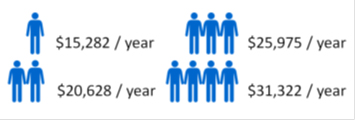2013 Public Policy
Legislative Recap
During the 2013 Colorado legislative session, The Women's Foundation of Colorado supported two bills designed to help low-income women – SB-001 and SB-200. Both of these bills passed and were signed into law.
Senate Bill 13-001, L.005 Working Families Economic Opportunity Act of 2013
Senate Bill 13-001 supports low-income women. This bill includes tax credits that reward working women and uses proven strategies to lift women and children out of poverty.
What This Bill Does for Working Families:
Colorado Earned Income Tax Credit (EITC)
- This bill makes the Colorado EITC permanent and equal to 7.0% of the federal EITC claimed in the first year, 8.5% in the second and 10.0% in the third and subsequent years.
- The EITC is refundable and is extended to low and middle-income working families; the credit varies depending on whether a taxpayer is single or married and the number of children in the home.
- For tax year 2012, the maximum credit is $5,891 for three or more qualifying children and $475 for households with no qualifying children; taxpayers must have an income less than a certain amount, and for a taxpayer with three or more children that amount is $45,060 in 2012.
Colorado Child Tax Credit (CTC)
- This bill creates a Colorado Child Tax Credit that is refundable and allows taxpayers to claim a credit equal to a percentage of both the federal refundable and nonrefundable CTC for each qualifying child under 6 years old.
- The credit amount is based on the household income and is phased out above a certain income level.
Why This Bill Is Important for Working Families and Local Economies
- These refundable tax credits are investments that prioritize Colorado’s working families and children.
- The Colorado EITC leverages and builds on the proven success of the federal EITC to help low and middle-income working families make ends meet and reduce child poverty.
- Additional income from measures such as EITC and CTC encourages success in school and contributes to better health outcomes; more financial security means greater family stability.
- These refundable tax credits will be a critical asset for the many Colorado families that have experienced temporary job loss, seen their work hours cut or their pay reduced.
Senate Bill 13-200 Medicaid Expansion in Colorado
Senate Bill 13-200 expands the eligibility levels for Medicaid and provides health insurance to more low-income women and children.
What This Bill Does for Low-Income Women and Families
- The health care coverage provided through Medicaid allows Coloradans in every corner of our state to access primary and preventive care. Through Medicaid, Colorado families are able to receive the health care services they need in order to live healthier lives and avoid having to go to the emergency room for routine care.
- The bill will increase Medicaid eligibility in Colorado from those who earn 100 percent of the federal poverty level (FPL) to include Coloradans with incomes up to 133 percent of the FPL. 2013 income levels by family size for 133 percent of the FPL in Colorado:

- When expanded, Colorado’s Medicaid program will provide coverage to an additional 160,000 Coloradans.
Why This Bill Is Important for Colorado
- Health improved and lives saved. The expanded coverage means that more Coloradans will get the care they need at the right time and in the right place. The expansion can also be translated into lives saved. The New England Journal of Medicine reported that there is a demonstrated reduction in mortality associated with Medicaid expansion in other states — here in Colorado alone, it could translate to more than 600 lives saved per year.
- Economy strengthened. A study commissioned by The Colorado Health Foundation says that Medicaid expansion will lead to the creation of more than 22,000 jobs in Colorado and increase economic activity by $4.4 billion.
- Savings to the state, hospitals and businesses. Expanding coverage for the uninsured leads to a reduction in the costs of uncompensated care that are shifted to insured patients and the business community. According to the Kaiser Commission on Medicaid and the Uninsured, the Medicaid expansion could save millions of dollars in uncompensated care over 10 years.
Join Us
WFCO invites you to join us in leading systemic change on behalf of women and their families. Through a unified voice we can influence positive community outcomes. Stay tuned for updates before, during, and after the session, and in the meantime, here's how you can help support our advocacy efforts!
- The Womanifesto. Download and share our nonpartisan voter handbook.
- Help inform the conversation. Share WFCO’s recent research that is informing our advocacy work.
- Vote and advocate. Read our civic engagement guide to learn how you can make a difference, from voting to how to contact your legislators.
- Join us to learn more. Attend an upcoming community education event and sign up for our eNewsletter to receive information and updates.
- Follow and share. Follow us on Facebook, Twitter, LinkedIn, and Instagram for policy updates throughout the year.
- Share your ideas with us. Let us know when you see a challenge in your community that could be improved by a policy change, email us at wfco@wfco.org.